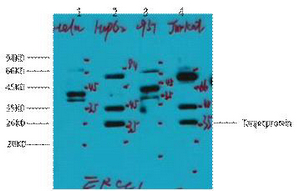BLK (Phospho Tyr389) rabbit pAb
- Catalog No.:YP1695
- Applications:WB
- Reactivity:Human;Mouse;Rat
- Target:
- BLK
- Gene Name:
- BLK
- Protein Name:
- BLK (Phospho-Tyr389)
- Human Gene Id:
- 640
- Human Swiss Prot No:
- P51451
- Mouse Gene Id:
- 12143
- Mouse Swiss Prot No:
- P16277
- Immunogen:
- Synthesized peptide derived from human BLK (Phospho-Tyr389)
- Specificity:
- This antibody detects endogenous levels of BLK (Phospho-Tyr389) at Human, Mouse,Rat
- Formulation:
- Liquid in PBS containing 50% glycerol, 0.5% BSA and 0.02% sodium azide.
- Source:
- Polyclonal, Rabbit,IgG
- Dilution:
- WB 1:500-2000
- Purification:
- The antibody was affinity-purified from rabbit serum by affinity-chromatography using specific immunogen.
- Concentration:
- 1 mg/ml
- Storage Stability:
- -15°C to -25°C/1 year(Do not lower than -25°C)
- Other Name:
- Tyrosine-protein kinase Blk (EC 2.7.10.2) (B lymphocyte kinase) (p55-Blk)
- Molecular Weight(Da):
- 56kD
- Background:
- This gene encodes a nonreceptor tyrosine-kinase of the src family of proto-oncogenes that are typically involved in cell proliferation and differentiation. The protein has a role in B-cell receptor signaling and B-cell development. The protein also stimulates insulin synthesis and secretion in response to glucose and enhances the expression of several pancreatic beta-cell transcription factors. [provided by RefSeq, Aug 2010],
- Function:
- catalytic activity:ATP + a [protein]-L-tyrosine = ADP + a [protein]-L-tyrosine phosphate.,function:May function in a signal transduction pathway that is restricted to B-lymphoid cells.,similarity:Belongs to the protein kinase superfamily. Tyr protein kinase family. SRC subfamily.,similarity:Contains 1 protein kinase domain.,similarity:Contains 1 SH2 domain.,similarity:Contains 1 SH3 domain.,
- Subcellular Location:
- Cell membrane ; Lipid-anchor . Present and active in lipid rafts. Membrane location is required for the phosphorylation of CD79A and CD79B (By similarity). .
- Expression:
- Expressed in lymphatic organs, pancreatic islets, Leydig cells, striate ducts of salivary glands and hair follicles.
- June 19-2018
- WESTERN IMMUNOBLOTTING PROTOCOL
- June 19-2018
- IMMUNOHISTOCHEMISTRY-PARAFFIN PROTOCOL
- June 19-2018
- IMMUNOFLUORESCENCE PROTOCOL
- September 08-2020
- FLOW-CYTOMEYRT-PROTOCOL
- May 20-2022
- Cell-Based ELISA│解您多样本WB检测之困扰
- July 13-2018
- CELL-BASED-ELISA-PROTOCOL-FOR-ACETYL-PROTEIN
- July 13-2018
- CELL-BASED-ELISA-PROTOCOL-FOR-PHOSPHO-PROTEIN
- July 13-2018
- Antibody-FAQs



